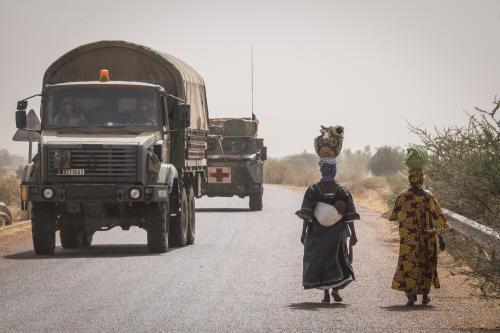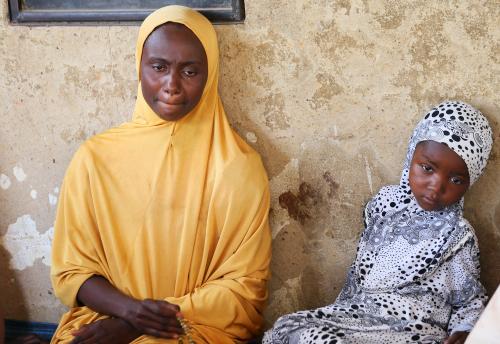President Obama’s visit to Kenya this week is a milestone in deepening Kenya-U.S. bilateral relations. The visit encompasses important meetings between Kenya and U.S. administrations as well as his participation in the Sixth Global Entrepreneurship Summit. Obama’s participation in the summit gives the summit more prominence and opens an opportunity for Kenyan entrepreneurs to showcase their innovative skills, entrepreneurial spirit, and potential to the world—especially as Kenya is a country with an emerging culture of entrepreneurship.
Perhaps more impactful, though, are the bilateral talks between President Kenyatta and Obama. The two leaders are likely to discuss a wide range of issues including security, investment, trade, health, tourism, renewable energy, agriculture, infrastructure development, leadership, and governance challenges such as corruption and impunity. However, more emphasis will be on how deepened cooperation will enable Kenya to realize its development goals. Specifically, Nairobi’s position during the talks will likely center around the objectives of its long term development plan, Vision 2030, the new foreign and diaspora policy, and the al-Shabab threat.
Due to security threats posed by al-Shabab extremists, security is likely to be a major issue between the two leaders. Kenya is a strategic partner of the U.S. in the counterterrorism initiatives in East Africa and the Horn of Africa—hence the need to develop more innovative means of counteracting the emerging security threats.
Since 2012, approximately 600 people have lost their lives in Kenya while many others have been injured at the hands of suspected al-Shabab militants. The impact of al-Shabab incursions into the country is being felt especially in northeastern region of the country, mostly inhabited by Kenyan Somalis and in which socio-economic activities are constantly under threat. Health and education sectors in the region have also been affected severely as many non-Somali Kenyans have fled the region. Insecurity has also had a negative impact on tourism, which is a major foreign exchange earner for the country. Many Kenyans have lost their jobs in the tourism sector due to security and travel advisories.
Security cooperation between Nairobi and Washington has included sharing intelligence information, training Kenyan security personnel in the U.S., receiving equipment from the U.S., and other logistical support. However, Kenya still faces security challenges and, hence, will be seeking more support, including financing, from the U.S. Also on the table is likely the Security Governance Initiative (SGI), an outcome of the U.S.- Africa Leadership Summit last year, which is a cooperative venture between the U.S. and six African countries—Kenya, Ghana, Mali, Niger, Nigeria, and Tunisia—will offer a comprehensive approach in improving security sector governance.
Some of the security challenges in the country are definitely linked to armed conflict and state failure in the region. Kenya’s policy of good neighborliness links its development and prosperity with the security and stability of neighboring countries. In particular, armed conflicts and lawlessness in South Sudan and Somalia are a great threat to Kenya’s core interests. It is important that Kenyan leadership lobby the U.S. during the forthcoming talks in finding more pragmatic solutions to Juba and Mogadishu.
Economic diplomacy is a key focus of Kenya’s new foreign policy. Regional integration and multilateralism; diversification of the export market and tourism sources; alternative sources of foreign direct investment, energy and technology; and engagement of both traditional partners and emerging economic powers have become the central pillars of the country’s foreign economic relations. On the other hand, the U.S. seems to be shifting its engagement with African countries by integrating its traditional core priorities with new ones. Overall, as Africa deepens its economic cooperation with the emerging economies, including the BRICS and middle-sized economies, the U.S. is progressively “mainstreaming” trade and business cooperation in its overall policy towards Africa. Africa need not be merely a recipient of preferential trade; it has potential as a rapidly evolving market and investment destination.
As noted above, Nairobi will likely approach the talks with the intention of prioritizing key issues that might bring more tangible results in line with the Vision 2030, foreign and diaspora policies and other development programs. Trade, investment, energy, tourism, science and technology, human capital development, health, and agriculture are some of the core issues critical in realizing the country’s development goals. How to align the myriad of U.S. programs intended to spur economic growth, trade, and investment—such as the New Alliance for Food Security and Nutrition, Open Government Partnership, African Growth and Opportunity Act (AGOA), Partnership for Growth, Trade Africa, and Power Africa—with Kenyan priorities should be a top aim for Kenyatta during the talks.
Kenya-U.S. trade relations are particularly anchored on the AGOA regime. Kenya’s total exports to the U.S. have steadily increased in the last few years. For example, the value of exports to the U.S. in 2014 was $420.8 million, an increase from $247.2 million in 2010. Kenya’s main exports to the U.S. include articles of apparel and clothing accessories, coffee, titanium ores, and concentrates. The value of imports from the U.S. has also been on the rise since 2010. While the value of imports was $431.8 million in 2010, it increased substantially to $1.85 billion in 2014. Kenya should capitalize on this growing relationship and take advantage of the U.S. president’s visit to seek more concessions from Washington in order to benefit more Kenyan exporters in accessing the U.S. market. For example, small-holder farmers and entrepreneurs are yet to realize the full benefits of this bilateral agreement. The majority is not even aware of its existence, and the few who are aware of the opportunity are unable to fully maximize on it in order to make profits. Here is a major opportunity for growth. Similarly, how to better utilize the Partnership for Growth and Trade Africa, which also hold great potential for Kenya, should be an important piece of the trade discussions.
Power Africa was launched during Obama’s trip to Africa in June 2013. The long-term objective of the initiative is to double access to cleaner, reliable, and efficient electricity to sub-Saharan Africa through partnerships with donors and the private sector. Currently, the cost of power is a major hindrance to many small-sized and medium-sized businesses as well as large investors in Kenya. Availability of a cheap energy source is critical to all sectors including business, transport, tourism, education, health, agriculture, and light manufacturing sectors. Moreover, women and youth empowerment programs can be boosted by reliable and affordable energy sources. This initiative will go a long way in improving the lives of Kenyans, especially in the rural areas, where currently they have limited access to electricity supply and often spend a fortune getting basic services. It will effectively reduce the cost of living among the poor because electricity will be more affordable. With an improvement in the business environment, this initiative would tremendously catalyze the rate at which the country industrializes. Therefore, Kenyatta should engage President Obama on how this promising initiative can be fast-tracked to benefit more people—as often projects like this take some time— especially as some critics have claimed that its progress has been slow and even hampered recently.
Finally, Kenyan relations with the U.S. are premised on the country’s governance structures and respect for human rights. Kenya needs to assure the U.S. that there are concrete efforts to strengthen governance institutions, and that the country is moving towards strict observance of the rule of law. The recent arrests and prosecutions targeting senior state officers accused of corruption are an indicator of the government’s commitment to slay the dragon of corruption. However, more should be done to prove that leadership does not condone the culture of impunity, especially when it comes to plunder of public resources. The Kenyan government needs to demonstrate that there is synergy between the public and private sectors in achieving targeted reforms, for example in the power sector. As Kenya seeks more assistance to combat terrorism and bolster its internal security, it will be important to reassure the American government that measures have been put in place to ensure that the resources are managed prudently.
Note:
The authors are scholars at the Kenya Institute for Public Policy Research and Analysis (KIPPRA). KIPPRA is one of the Brookings Africa Growth Initiative’s local think tank partners based in Africa. This blog reflects the views of the authors only and does not reflect the views of the Africa Growth Initiative.



Commentary
Deepening Kenya-U.S. relations: Prospects for President Obama’s visit to Kenya
July 24, 2015